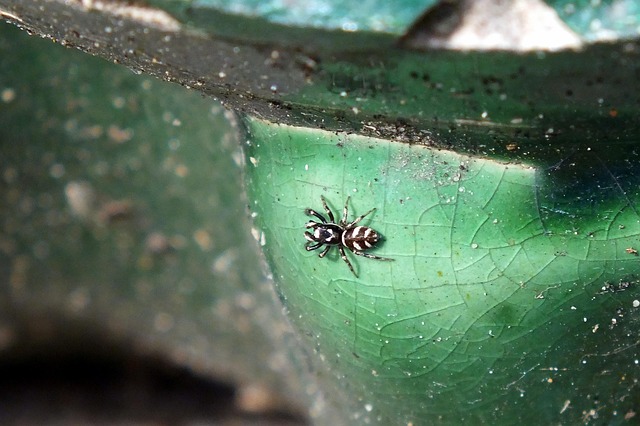Homeowners seeking humane and eco-conscious spider prevention methods can employ strategic changes to create a spider-unfriendly environment. Understanding spider behavior, which includes food, web space, and safety needs, allows for non-toxic deterrents like sealing entry points, removing webs promptly, using natural repellents (e.g., lemon juice, essential oils), and promoting natural predators. Effective pest control for spiders involves a combination of natural methods and sustainable strategies, such as using specific essential oils, installing birdhouses, cultivating spider-repelling plants, maintaining clean living spaces, and adjusting home ventilation to discourage infestations without harming them or the local ecosystem.
Tired of sharing your space with unwelcome eight-legged visitors? Discover humane and eco-conscious approaches to spider prevention that respect both your well-being and the environment. This guide explores understanding spider behavior, from their habits and needs to effective, green pest control techniques. Learn alternative methods to keep spiders at bay without harmful chemicals, and create an inhibitive environment using safe and effective deterrents. Take back your space with peace of mind.
Understanding Spider Behavior: Unraveling Their Habits and Needs
Spiders are often considered both fascinating and frightening creatures, leading many homeowners to seek effective yet humane and eco-conscious methods for spider prevention as part of their pest control strategies. Understanding their behavior is a crucial step in this process. Spiders are arachnids with an innate need to find food, build webs, and ensure their safety. They are highly sensitive to vibrations and scent markings, which guide them towards potential prey or hazards. By knowing these habits, we can implement non-toxic deterrents that disrupt their paths without causing harm.
In terms of pest control for spiders, creating an environment that discourages their presence involves simple yet strategic changes. Keeping homes clean, sealing entry points, and removing webs promptly reduces their appeal as living spaces. Using natural repellents like lemon juice or essential oils can also deter them without resorting to harsh chemicals. These methods not only promote a healthier indoor environment but also contribute to the preservation of local ecosystems by minimizing the use of harmful pesticides.
Eco-Friendly Spider Prevention Methods for a Greener Home
When it comes to spider prevention, many traditional methods rely heavily on chemical-based pest control, which can have detrimental effects on both your health and the environment. However, there are numerous eco-friendly alternatives that allow you to keep spiders at bay while maintaining a greener home. One effective approach is to focus on natural deterrents. Spiders are often attracted to certain scents, so using essential oils like citronella, peppermint, or tea tree oil can help ward them off. You can diffuse these oils in your living spaces or even create homemade spider repellents by mixing essential oils with water and spraying them around entry points.
Another sustainable strategy is to encourage natural predators in your home. Many birds, such as sparrows and swallows, feed on spiders. Installing birdhouses or creating bird-friendly spaces in your yard can attract these beneficial insects. Additionally, certain plants like lavender, marigolds, and lemongrass are known to repel spiders naturally. Integrating these plants into your garden or indoor decor not only adds beauty but also contributes to a spider-free environment without resorting to harmful chemicals, making it an ideal solution for those seeking eco-conscious pest control for spiders.
Alternative Pest Control Techniques to Keep Spiders at Bay
In the quest to keep spiders away, it’s essential to explore alternative pest control techniques that are both humane and eco-friendly. Traditional methods often rely on toxic chemicals, but these can be harmful to non-target species and the environment. Instead, consider employing natural deterrents like essential oils—such as peppermint, lemon, or lavender—which have been proven effective in repelling spiders without causing them harm. Planting herbs like mint, rosemary, and marigolds around your home can also act as a natural barrier, as these plants emit scents that spiders find unpleasant.
Additionally, maintaining a clean and clutter-free environment is crucial for pest control for spiders. Regularly vacuuming and sweeping helps eliminate webbing and hiding spots. Making adjustments to your home’s exterior, such as sealing entry points and ensuring proper ventilation, can also deter spiders from entering. These non-toxic, sustainable approaches not only keep spiders at bay but also promote a healthier living environment for both you and the local ecosystem.
Creating an Inhibitive Environment: Safe and Effective Spider Deterrents
Creating an environment that discourages spiders is a key aspect of humane and eco-conscious spider prevention. One effective strategy is to maintain a clean and clutter-free space, as spiders are attracted to dark, tight spaces where they can easily hide. Regularly cleaning and decluttering areas prone to spider activity can significantly reduce their presence. Additionally, sealing entry points like gaps in doors, windows, and walls can prevent spiders from entering homes or buildings.
When it comes to pest control for spiders, there are several safe and effective deterrents that can be used without causing harm to humans, pets, or the environment. Essential oils like peppermint, lemon, and lavender have been shown to repel spiders naturally. Diffusing these scents in problem areas or using them in homemade sprays can create a protective barrier against spiders. Plant-based insecticides and diatomaceous earth are also popular choices. These natural deterrents disrupt the spider’s outer shell, causing dehydration and eventual death without leaving toxic residues.
In addressing spider prevention, a balanced approach that combines understanding their behavior with eco-conscious methods is key. By adopting these humane techniques, from identifying and sealing entry points to utilizing natural repellents, you can create an environment that discourages spiders without causing harm. These strategies not only protect your home but also contribute to a greener, more sustainable living space. Incorporating these practices into your pest control routine ensures a safe, spider-free home while minimizing environmental impact.
